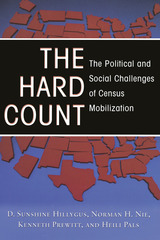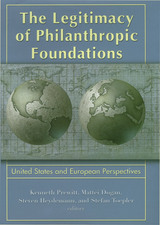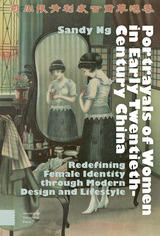2 books by Prewitt, Kenneth

The Hard Count
The Political and Social Challenges of Census Mobilization
D. Sunshine Hillygus
Russell Sage Foundation, 2006
American democracy relies on an accurate census to fairly allocate political representation and billions of dollars in federal funds. Declining participation in previous censuses and a general waning of civic engagement in society raised the possibility that the 2000 count would miss many Americans—disproportionately ethnic and racial minorities—depriving them of their share of influence in American society and yielding an unfair distribution of federal resources. Faced with this possibility, the Census Bureau launched a massive mobilization campaign to encourage Americans to complete and return their census forms. In The Hard Count, former Census Bureau director Kenneth Prewitt, D. Sunshine Hillygus, Norman H. Nie, and Heili Pals present a rigorous evaluation of this campaign. Can a busy, mobile, disengaged public be motivatived to participate in this civic activity? Using a rich set of data and drawing on theories of civic mobilization, political persuasion, and media effects, the authors assess the factors that influenced participation in the 2000 census.. The Hard Count profiles a watershed moment in the history of the American census. As the mobilization campaign was underway, political opposition to the census sprang up, citing privacy issues and seeking to limit the kind of data the census could collect. Hillygus, Nie, Prewitt, and Pals analyze the competing effects of the mobilization campaign and the privacy controversy on public attitudes and cooperation with the census. Using an internet based survey, the authors tracked a representative sample of Americans over time to gauge changes in census attitudes, privacy concerns, and their eventual decision whether or not to return their census form. The study uniquely captures the public's exposure to census advertising, community mobilization, and news stories, and was designed so people could view video clips and photos of actual campaign advertisements on their sets in their homes. The authors find that the Census Bureau campaign did in fact raise awareness of the census and census participation. The mobilization campaign was especially effective at increasing participation among groups historically undercounted by the census. They also find that census participation would have been higher if not for the privacy controversy, which discouraged many people from cooperating with the census and led others to omit information from their census form. The findings of The Hard Count have important policy implications for future census counts and offer theoretical insights regarding the influence of mobilization campaigns on civic participation. The goal of full and equal cooperation with the decennial census and other government surveys is an important national priority. The Hard Count shows that a mobilization campaign can dramatically increase voluntary participation in the decennial headcount and identifies emerging social and political challenges that may threaten future census counts and contribute to the growing fragility of our national statistical system.. A Volume in the Russell Sage Foundation Census Series
[more]

Legitimacy of Philanthropic Foundations
United States and European Perspectives
Kenneth Prewitt
Russell Sage Foundation, 2006
Though privately controlled, foundations perform essential roles that serve society at large. They spearhead some of the world's largest and most innovative initiatives in science, health, education, and the arts, fulfilling important needs that could not be addressed adequately in the marketplace or the public sector. Still, many people have little understanding of what foundations do and how they continue to earn public endorsement. The Legitimacy of Philanthropic Foundations provides a thorough examination of why foundations exist and the varied purposes they serve in contemporary democratic societies. The Legitimacy of Philanthropic Foundations looks at foundations in the United States and Europe to examine their relationship to the state, the market, and civil society. Peter Frumkin argues that unlike elected officials, who must often shy away from topics that could spark political opposition, and corporate officers, who must meet bottom-line priorities, foundations can independently tackle sensitive issues of public importance. Kenneth Prewitt argues that foundations embody elements of classical liberalism, such as individual autonomy and limited government interference in private matters and achieve legitimacy by putting private wealth to work for the public good. Others argue that foundations achieve legitimacy by redistributing wealth from the pockets of rich philanthropists to the poor. But Julian Wolpert finds that foundations do not redistribute money directly to the poor as much as many people believe. Instead, many foundations focus their efforts on education, health, and scientific research, making investments that benefit society in the long-term, and focusing on farsighted issues that a myopic electorate would not have patience to permit its government to address. Originating from private fortunes but working for the public good, independently managed but subject to legal prescriptions, philanthropic foundations occupy a unique space somewhere between the public and private sectors. The Legitimacy of Philanthropic Foundations places foundations in a broad social and historical context, improving our understanding of one of society's most influential—and least understood—organizational forms.
[more]
READERS
Browse our collection.
PUBLISHERS
See BiblioVault's publisher services.
STUDENT SERVICES
Files for college accessibility offices.
UChicago Accessibility Resources
home | accessibility | search | about | contact us
BiblioVault ® 2001 - 2024
The University of Chicago Press









